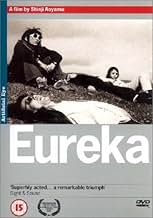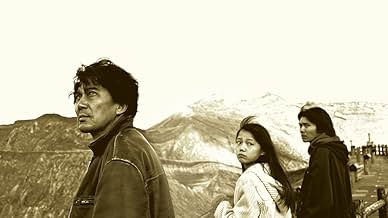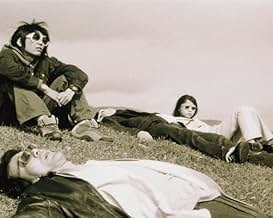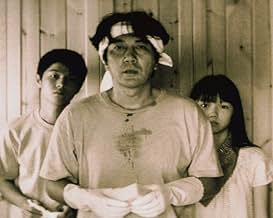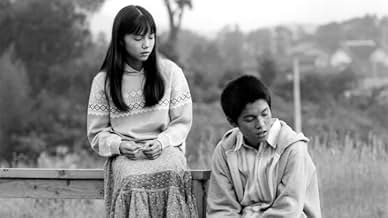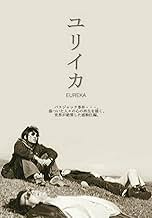AVALIAÇÃO DA IMDb
7,7/10
4,5 mil
SUA AVALIAÇÃO
Sobreviventes traumatizados de um sequestro de ônibus se reúnem e embarcam em uma viagem pela estrada para tentar superar o evento. Enquanto isso, um assassino em série está solto.Sobreviventes traumatizados de um sequestro de ônibus se reúnem e embarcam em uma viagem pela estrada para tentar superar o evento. Enquanto isso, um assassino em série está solto.Sobreviventes traumatizados de um sequestro de ônibus se reúnem e embarcam em uma viagem pela estrada para tentar superar o evento. Enquanto isso, um assassino em série está solto.
- Prêmios
- 4 vitórias e 2 indicações no total
Avaliações em destaque
10x-miner
I've seen EUREKA yesterday, and I really am impressed.
Along with those beautiful and sophisticated pictures in coloured black-and-white comes a great story; the movie takes both its time to roll out the plot and portrait the main characters. Each single scene is valuable, worth to be seen, contributes a lot to the whole, EUREKA is --despite its sheer enormity-- concentrated on the essentials and thus compact... and: the characters are authentic.
What else can I say? Go, see and feel it!
Along with those beautiful and sophisticated pictures in coloured black-and-white comes a great story; the movie takes both its time to roll out the plot and portrait the main characters. Each single scene is valuable, worth to be seen, contributes a lot to the whole, EUREKA is --despite its sheer enormity-- concentrated on the essentials and thus compact... and: the characters are authentic.
What else can I say? Go, see and feel it!
10aapp22
During its epic 3,5 hours of duration I managed to make some coffee, fry some eggs and let me assure you that I was a totally different man when it ended - It made me think about the real meaning of life, its beauty and subsequent horrors which we all go through at some point in our existence.
This is sophisticated film-making at its best.
This is sophisticated film-making at its best.
10gmwhite
I wouldn't give many films a score of ten unless they were truly outstanding, not just better, but in a whole different league. It is a grade reserved for the likes of (if I may indulge in a little subjectivity) Tarkovsky's Stalker;, Kitano's Hana-Bi, In the Mood for Love' by Wong Kar-wai, Dreyer's Passion of Joan of Arc, Ozu's Tokyo Story; and very few others. It is more than mere technical brilliance, top-class acting, superb plot or camera-work. What each of these films possesses is sheer humanity, simultaneously painful and life-affirming.
Eureka deserves to stand proudly in such company, for Eureka is a film that is so human it makes most others seem either shallow, over-wrought, or just pretentious. Eureka's plot is a simple, its action, dialog and soundtrack is sparse, camera movement is minimal. The sepia-toned photography is indeed a marvel to look at, and each of the actors performs with such restrained naturalness that they don't seem like performances at all. The result is a film that is less like a story being told, and more like an experience that is undergone or a journey shared. If there is any 'art' involved, it is in producing a film so fragile, yet so accessible, so desperately and painfully human out of material so grueling and alien to most of us fortunate viewers. And in this respect, the movement of Eureka mirrors that of the protagonists, the three traumatised survivors of a bloody bus high-jacking. They are a brother and sister,and the bus driver himself. In the wake of the tragedy, after some months of wandering and inactivity, they are drawn back together and set out on a bus.
As may be gathered, this film is very much about the aftermath of tragedy, about how certain experiences may mark one off from the rest of society, and how with silence, stillness and human company, and most importantly, the passing of time, some form of healing may be glimpsed. And it is just a glimpse. Though the final scene is indeed moving, there is no big payoff, anymore than there might be in life itself. There is only the artistry of the film itself to transfigure the story, and it does this with such quiet, unobtrusive sympathy, that to call it 'artistry' seems almost to malign it. I haven't seen Aoyama's other films, so I can't say whether he is destined for a Tarkovsky-, Dreyer- or Ozu-like elevation to the cinematic pantheon, but this film is a refreshing example of the kind of deep humanity of the best directors, the best artists, one that marks a perfect 10 off from all the rest.
Eureka deserves to stand proudly in such company, for Eureka is a film that is so human it makes most others seem either shallow, over-wrought, or just pretentious. Eureka's plot is a simple, its action, dialog and soundtrack is sparse, camera movement is minimal. The sepia-toned photography is indeed a marvel to look at, and each of the actors performs with such restrained naturalness that they don't seem like performances at all. The result is a film that is less like a story being told, and more like an experience that is undergone or a journey shared. If there is any 'art' involved, it is in producing a film so fragile, yet so accessible, so desperately and painfully human out of material so grueling and alien to most of us fortunate viewers. And in this respect, the movement of Eureka mirrors that of the protagonists, the three traumatised survivors of a bloody bus high-jacking. They are a brother and sister,and the bus driver himself. In the wake of the tragedy, after some months of wandering and inactivity, they are drawn back together and set out on a bus.
As may be gathered, this film is very much about the aftermath of tragedy, about how certain experiences may mark one off from the rest of society, and how with silence, stillness and human company, and most importantly, the passing of time, some form of healing may be glimpsed. And it is just a glimpse. Though the final scene is indeed moving, there is no big payoff, anymore than there might be in life itself. There is only the artistry of the film itself to transfigure the story, and it does this with such quiet, unobtrusive sympathy, that to call it 'artistry' seems almost to malign it. I haven't seen Aoyama's other films, so I can't say whether he is destined for a Tarkovsky-, Dreyer- or Ozu-like elevation to the cinematic pantheon, but this film is a refreshing example of the kind of deep humanity of the best directors, the best artists, one that marks a perfect 10 off from all the rest.
Amazing film. The reviews posted - at the time of this writing - on the IMDb page are sad, because I don't think the writers were ready for what kind of movie it is. (Stephen Holden's pan in the New York Times is especially foolhardy and thoughtless.) It helped to have a little advanced word, in order to brace myself. As it stands, it should have defeated "Dancer in the Dark" at Cannes last year, handily. And if I see a better movie this year, it'll be something for the history books.
It's not for the faint of heart. It's three hours and thirty-seven minutes long, in black and white, and in Japanese. And it's very slow-moving. The cinematography is beautiful, but that may not be enough for folks to hack through nearly four hours.
But the extreme length and slowness is not unjustified. It opens with a horrifying, traumatic event that provides an emotional undercurrent that informs the remainder of the story, in much the same way as "Saving Private Ryan" did (let that not discourage the anti-Spielbergers), and as the film progresses, the event becomes a memory, part of the characters' and ours, too. And the slowness isn't really slowness - it's the playing out of events and interactions as they would happen in real time (the story spans a few months, I believe, perhaps even a year, and maybe more).
"What's the freaking story?" I hear you ask...well, here goes. The opening sequence, which will undoubtedly inspire comparisons and contrasts to "The Sweet Hereafter" (as will the entire film), shows the hijacking of a commuter bus by a businessman pushed over the edge. As the scene unfolds, he has already killed a few passengers, the police are surrounding the bus, and he has used newspapers to block all the windows.
Without revealing too much, the bus driver and two teens - a brother and a sister - survive the incident. The driver (Koji Yakusho, star of "Shall We Dance?" and "The Eel") is shaken deeply, and leaves his brother and parents to wander. The youths' mother runs off with another man, and their father dies soon after in an auto accident - with insurance payments, they can live, but there is no one to watch over them.
I could go into more of the plot - and most critics will, I'm sure - but that isn't really necessary. The key to the movie is that the events seem to be played out as they would in real life, and that the movie camera just "happens to be there" to catch them and tell the story. Sure, this is the goal of all narrative films, but with "Eureka," the process seems to have been reinvented and renewed. The film is longer than most, but not a moment is wasted; it's one of the most efficiently edited movies I've ever seen. Every shot, nuance, glance, spoken word, everything has a reason for being.
There are some who say the movie is too somber, too gloomy. It isn't really. It's somber, sure, but it doesn't strain for it. There is humor - deadpan, mostly - and great joy, too. And if you love great cinema, there is even greater joy!
It's not for the faint of heart. It's three hours and thirty-seven minutes long, in black and white, and in Japanese. And it's very slow-moving. The cinematography is beautiful, but that may not be enough for folks to hack through nearly four hours.
But the extreme length and slowness is not unjustified. It opens with a horrifying, traumatic event that provides an emotional undercurrent that informs the remainder of the story, in much the same way as "Saving Private Ryan" did (let that not discourage the anti-Spielbergers), and as the film progresses, the event becomes a memory, part of the characters' and ours, too. And the slowness isn't really slowness - it's the playing out of events and interactions as they would happen in real time (the story spans a few months, I believe, perhaps even a year, and maybe more).
"What's the freaking story?" I hear you ask...well, here goes. The opening sequence, which will undoubtedly inspire comparisons and contrasts to "The Sweet Hereafter" (as will the entire film), shows the hijacking of a commuter bus by a businessman pushed over the edge. As the scene unfolds, he has already killed a few passengers, the police are surrounding the bus, and he has used newspapers to block all the windows.
Without revealing too much, the bus driver and two teens - a brother and a sister - survive the incident. The driver (Koji Yakusho, star of "Shall We Dance?" and "The Eel") is shaken deeply, and leaves his brother and parents to wander. The youths' mother runs off with another man, and their father dies soon after in an auto accident - with insurance payments, they can live, but there is no one to watch over them.
I could go into more of the plot - and most critics will, I'm sure - but that isn't really necessary. The key to the movie is that the events seem to be played out as they would in real life, and that the movie camera just "happens to be there" to catch them and tell the story. Sure, this is the goal of all narrative films, but with "Eureka," the process seems to have been reinvented and renewed. The film is longer than most, but not a moment is wasted; it's one of the most efficiently edited movies I've ever seen. Every shot, nuance, glance, spoken word, everything has a reason for being.
There are some who say the movie is too somber, too gloomy. It isn't really. It's somber, sure, but it doesn't strain for it. There is humor - deadpan, mostly - and great joy, too. And if you love great cinema, there is even greater joy!
Eureka tells an enormously soul searching and moving story about three people's attempt to find meaning and purpose after experiencing a grizzly "busjack" (i.e. a bus hijack). Thus, its "subject matter" and the problem with which it deals is as old as philosophy itself: finding meaning and hope in a world where such senseless acts of violence and evil occurs. The three characters are Kozue (girl) and Naoki (boy), who are middle school aged siblings, and Makoto, who is the driver of the hijacked bus. They are eventually joined by the children's college-aged uncle, Akihiko (who also provides some memorable comedic moments).
There's not too much dialog in Eureka, as Kozue and Naoki are mute throughout much of the film (as a result of their trauma), but we can sense the confusing and searing emotions that lie just beneath their silence. Director Shinji Aoyama (wisely) lets the story and the characters unfold / develop at a very deliberate and slow pace, eschewing quick cutting and montage in favor of carefully crafted compositions within the vast cinemascope frame. Due to its realistic style, at times Eureka feels like a documentary.
Having said this, however, I can also say confidently that many will be put off by Eureka simply due to its epic running time (= 3 hours 37 minutes minus the credits). But let me just remark personally that although it _is_ long, Eureka definitely _feels_ a lot shorter (after it's over) than most 2 hour Hollywood films. (In fact, I don't think that Eureka would have worked as a "2 hour film"--for roughly the same reason that a "Reader's Digest" version of War and Peace wouldn't be as powerful as the full-length novel.) Don't get me wrong: Eureka is demanding (this is a "thinking person's" film), but it is not overly daunting. This is a daring film that asks a lot of its viewers, but which delivers much by way of emotional payoff (to those who persevere).
Eureka eventually turns into a kind of existential road movie, as the four characters try to "start over" by taking a trip on Makoto's new bus. And although I won't give it away, Eureka has an ending that is truly beautiful, quietly moving, and charged with a glimmer of hope.
Finally, although it is rarely heard in the film, the original musical score by Aoyama and Isao Yamada really adds emotional resonance whenever it plays. It's unforgettable and simultaneously beautiful and elegiac. Overall, I consider Eureka to be a great example of "humanistic" filmmaking in the tradition of Kurosawa and Ozu. Only time will tell whether or not it will be considered a masterpiece, but in my book Shinji Aoyama has created one of the truly unforgettable films of 2001.
There's not too much dialog in Eureka, as Kozue and Naoki are mute throughout much of the film (as a result of their trauma), but we can sense the confusing and searing emotions that lie just beneath their silence. Director Shinji Aoyama (wisely) lets the story and the characters unfold / develop at a very deliberate and slow pace, eschewing quick cutting and montage in favor of carefully crafted compositions within the vast cinemascope frame. Due to its realistic style, at times Eureka feels like a documentary.
Having said this, however, I can also say confidently that many will be put off by Eureka simply due to its epic running time (= 3 hours 37 minutes minus the credits). But let me just remark personally that although it _is_ long, Eureka definitely _feels_ a lot shorter (after it's over) than most 2 hour Hollywood films. (In fact, I don't think that Eureka would have worked as a "2 hour film"--for roughly the same reason that a "Reader's Digest" version of War and Peace wouldn't be as powerful as the full-length novel.) Don't get me wrong: Eureka is demanding (this is a "thinking person's" film), but it is not overly daunting. This is a daring film that asks a lot of its viewers, but which delivers much by way of emotional payoff (to those who persevere).
Eureka eventually turns into a kind of existential road movie, as the four characters try to "start over" by taking a trip on Makoto's new bus. And although I won't give it away, Eureka has an ending that is truly beautiful, quietly moving, and charged with a glimmer of hope.
Finally, although it is rarely heard in the film, the original musical score by Aoyama and Isao Yamada really adds emotional resonance whenever it plays. It's unforgettable and simultaneously beautiful and elegiac. Overall, I consider Eureka to be a great example of "humanistic" filmmaking in the tradition of Kurosawa and Ozu. Only time will tell whether or not it will be considered a masterpiece, but in my book Shinji Aoyama has created one of the truly unforgettable films of 2001.
Você sabia?
- CuriosidadesThe brother and sister in the film are played by real life brother and sister Aoi Miyazaki and Masaru Miyazaki.
- Citações
Makoto Sawai: Do you think one can live only for others?
Principais escolhas
Faça login para avaliar e ver a lista de recomendações personalizadas
- How long is Eureka?Fornecido pela Alexa
Detalhes
- Data de lançamento
- Países de origem
- Centrais de atendimento oficiais
- Idioma
- Também conhecido como
- Eureka
- Empresas de produção
- Consulte mais créditos da empresa na IMDbPro
Bilheteria
- Faturamento bruto nos EUA e Canadá
- US$ 49.388
- Faturamento bruto mundial
- US$ 49.388
- Tempo de duração3 horas 37 minutos
- Cor
- Mixagem de som
- Proporção
- 2.35 : 1
Contribua para esta página
Sugerir uma alteração ou adicionar conteúdo ausente


